The Sociology of Fear
audiobook (Unabridged) ∣ Exploring How Fear Shapes Our Social Lives
By Fred Grandsen

Sign up to save your library
With an OverDrive account, you can save your favorite libraries for at-a-glance information about availability. Find out more about OverDrive accounts.
Find this title in Libby, the library reading app by OverDrive.



Search for a digital library with this title
Title found at these libraries:
| Library Name | Distance |
|---|---|
| Loading... |
Fear is a fundamental aspect of human experience, shaping behaviors, relationships, and societal structures. While fear is often viewed as an individual, psychological response to threats, its impact extends far beyond personal emotions. It plays a crucial role in shaping communities, influencing institutions, and guiding social interactions. Understanding fear from a sociological perspective allows us to see how it is constructed, manipulated, and experienced collectively.
At its core, fear serves an essential function in human survival. It triggers physiological and psychological responses designed to protect individuals from harm. However, in a social context, fear is not merely a reaction to immediate danger but a product of cultural norms, historical experiences, and institutional influences. What one society deems fearful may not be considered threatening in another, highlighting the socially constructed nature of fear. Media, governments, and social groups often define what is to be feared and how people should respond, reinforcing shared anxieties and collective behavioral patterns.
Fear also plays a significant role in maintaining social order. Authorities, institutions, and cultural narratives often use fear to promote conformity and discourage deviance. For instance, fear of punishment deters individuals from committing crimes, while fear of social rejection enforces adherence to cultural norms. In political and economic spheres, fear can be leveraged as a tool of control, influencing public opinion, voter behavior, and economic decisions. Political leaders may use fear of terrorism, crime, or economic collapse to justify policies that enhance their power, while corporations may capitalize on fears of illness or inadequacy to market their products.







